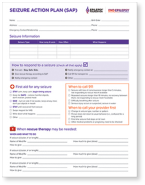


IT'S TIME TO RETHINK HOW
SEIZURE CLUSTERS ARE
TREATED
Sign up for news and information about epilepsy and seizures that may help turn your world right side up.
SIGN UPUnderstanding the need for rescue medication to treat seizure clusters
Despite the use of antiepileptic drugs (AEDs), 56% of patients still experience seizures.
While most seizures resolve quickly on their own, some do not and may require a rescue treatment to stop them. Often, this means a trip to the emergency room (ER), which can be costly and disruptive. Even patients who are taking AEDs as directed can experience seizures that need medical intervention. These may include prolonged seizures (lasting more than 5 minutes) or seizure clusters (seizures occurring more than 2 times in 24 hours). Either of these can progress to an emergency situation. That's why having an on-hand rescue treatment for seizure clusters is an important part of your seizure action plan.
In addition to daily AEDs, people at risk of prolonged seizures or seizure clusters should have access to a seizure rescue treatment they can carry with them at all times, in case it's needed.
Stopping seizures as soon as possible is critically important
Do you need a seizure action plan?
Seizures are unpredictable, but having an action plan might help you be prepared at all times.
An action plan tells your care partners what to do in case you need help.
An action plan may help you overcome 'seizure worry' so you can engage in more activities.
LET'S TALK…
Ask your healthcare team if your action plan should include on-hand rescue treatment for seizure clusters.

Create a seizure action plan that works for you
Courtesy of the Epilepsy Foundation
Learn more about Neurelis, the sponsor of Let’s Talk Seizures.
